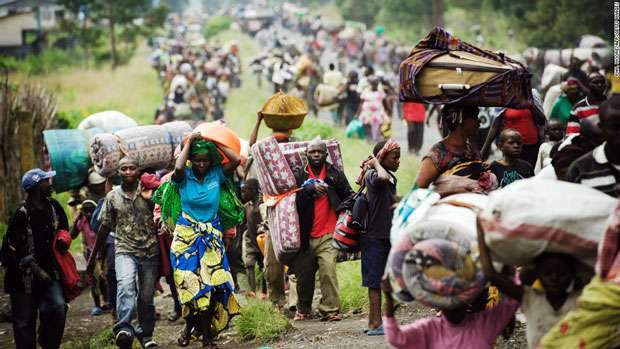Reply To:
Name - Reply Comment

 The general election has been postponed yet again. Will this country, the largest and potentially the richest in Africa, ever escape from its continuous dictatorship, and its propensity to civil war? It’s not so long ago that Susan Rice, the then US Ambassador to the United Nations, was talking about the Congo as the site of “Africa’s First World War”. Has the UN at long last really pacified this country that has been continuously in a state of unrest since the Belgian colonisers, after effectively looting the country, fled in 1960, turning the country over to a hastily improvised African government?
The general election has been postponed yet again. Will this country, the largest and potentially the richest in Africa, ever escape from its continuous dictatorship, and its propensity to civil war? It’s not so long ago that Susan Rice, the then US Ambassador to the United Nations, was talking about the Congo as the site of “Africa’s First World War”. Has the UN at long last really pacified this country that has been continuously in a state of unrest since the Belgian colonisers, after effectively looting the country, fled in 1960, turning the country over to a hastily improvised African government?
Today we can say that the fighting that has consumed the Congo is within sight of being over, apart from some localized violence in Kivus and Kasai provinces. But, given the history of the most turbulent of all African countries, we should say, let’s wait and see. Nevertheless, it is encouraging to know that the UN’s largest peacekeeping operation ever has met with this degree of success.
The results of this UN activism are impressive. Most of the country is quiet. The mining and agricultural sectors are recovering well. Hyperinflation has been tamed and the exchange rate remains stable. Mobile phone masts have been installed even where the roads have all but disappeared. Foreign investment is returning
This second UN intervention in the Congo appeared to be more successful than the first, back in 1960 when, fearful of the US and the Soviet Union competing to gain a foothold in Africa, Secretary-General Dag Hammarskjold, pushed for UN intervention, as the country’s post-independence civil war appeared to spin out of control. The UN did pacify the country to some degree -- at the cost of claiming Hammarskjold’s life in a supposed accident of his plane- but it left with its tail between its legs, handing the country over to 32 years of decadent and cruel rule by the masterful dictator, Mobutu Sese Seko.
For once in recent times the UN presence has been funded reasonably well, with the US the major contributor. Not least, unlike the first time, it had a unanimous Security Council mandate behind it, involving Chapter 7 of the Charter, which bestows the right to use military force.
The results of this UN activism are impressive. Most of the country is quiet. The mining and agricultural sectors are recovering well. Hyperinflation has been tamed and the exchange rate remains stable. Mobile phone masts have been installed even where the roads have all but disappeared. Foreign investment is returning.
All in all this has not been an easy nor an inexpensive UN operation nor one that has always run smoothly, as the serious allegations of rape made against some UN contingents attest. The UN operation has cost $1 billion a year to run. The general election in 2006 cost the international community half a billion dollars. Seeing the good work of past years coming undone, the Security Council authorized a peacekeeping brigade consisting of Malawians, South Africans and Tanzanians and were given an aggressive mandate to defeat M23 in Kivu.
Today we can say that the fighting that has consumed the Congo is within sight of being over, apart from some localized violence in Kivus and Kasai provinces. But, given the history of the most turbulent of all African countries, we should say, let’s wait and see. Nevertheless, it is encouraging to know that the UN’s largest peacekeeping operation ever has met with this degree of success
Yes, the financial cost is high but it is much less than what has been spent in Iraq and Afghanistan and the results more favourable. Indeed, one can plausibly argue that before the Western intervention in Iraq and Afghanistan, the Congo was the country of the three in the greater mess, with the most violence. Now it is the one with the least.
After the 2006 election it looked as if peace had finally arrived. But it didn’t. One of the main belligerents, the Congolese Rally for Democracy, Rwanda’s ally, did badly in the election and went from controlling one third of the country to securing only 3% representation in parliament. Not surprisingly, a number of its leaders went back to war. Fighting in the eastern Kivu province flared up. Now it is rather less.
Unfortunately, in the ensuing years the UN’s most active backers, the US and EU, took their eyes off the ball. Once the 2006 election was over interest in the Congo among top Western leaders dissipated.
Now they are being forced by events to focus again. Congo’s young ruler, Joseph Kabila, while stabilizing most of the country, has allowed massive corruption and manoeuvered to stay in power indefinitely. The constitution doesn’t allow it. There has been serious unrest especially in the capital. The Catholic bishops intervened as arbitrators, and that helped. At last there is going to be an election.
Of course, as the saying goes, “It is never over until the fat lady sings”. That’s for sure in the Congo.